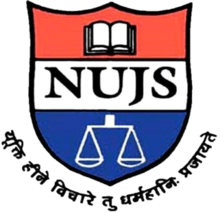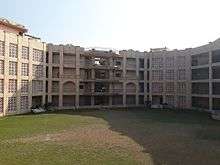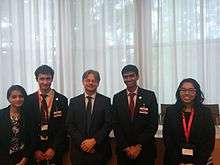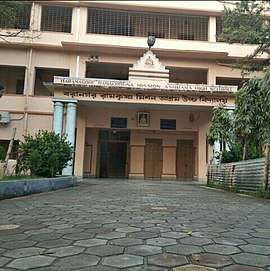West Bengal National University of Juridical Sciences
The West Bengal National University of Juridical Sciences (WBNUJS or NUJS) is a public law school and National Law University established in 1999, offering courses at the undergraduate and postgraduate levels. It is in Salt Lake City of Kolkata, West Bengal, India. It is one of the autonomous law schools in India.
 | |
| Motto | Yuktiheena Vicharetu Dharmahnih Prajayate |
|---|---|
Motto in English | Judgment Devoid of Logic Destroys Dharma |
| Type | National Law University |
| Established | 1999 |
| Founder | N. R. Madhava Menon |
| Chancellor | Chief Justice of India |
| Vice-Chancellor | N K Chakrabarti [1] |
| Location | , , |
| Campus | Urban |
| Affiliations | BCI; UGC |
| Website | www |
The university offers a five-year integrated B.A. LLB (Hons.) degree programme at the undergraduate level and a Master of Laws (LLM) programme at the postgraduate level. Admission to the former programme is through the Common Law Admission Test, a highly competitive, nationwide common entrance examination, held jointly by fourteen of the nineteen national law schools. NUJS also offers MPhil, PhD and diploma in business laws and other programs. It also offers a number of online courses that attract students from 17 countries across the world so far.[2]
History
| Vice-chancellors |
|---|
|
.jpg)
NUJS was established in 1999 by the Bar Council of India, in conjunction with the government of West Bengal. The Founder-Vice-Chancellor was Professor N.R. Madhava Menon, a former Professor of law of Delhi University and Founder-Director, National Law School of India University (NLSIU), Bangalore, who is credited with revolutionising the field of legal education in India by starting the concept of "national law schools", as opposed to the traditional law colleges prevalent before.
The NUJS, Kolkata, along with the NLSIU, Bengaluru, remain the only two national law schools which have the honourable Chief Justice of India as the Chancellor. This set-up provides an aura of exclusivity and rare stature to these National Law Schools in India. It may be noted that all other National Law Schools have the Chief Justice of the respective state High Courts as their Chancellors.[4]
The university was the brainchild of then Chief Minister Jyoti Basu.[5] Other eminent personalities without whose help and active intervention the university could not have been founded, include Sh. Jyoti Basu, a former Chief Minister of West Bengal who was a Middle Temple barrister;[6] Sh. Somnath Chatterjee, a former Speaker of the Lok Sabha, also a Middle Temple barrister and a leading member of the Calcutta Bar Library; and Justice Chittotosh Mookerjee, a former Chief Justice of the Calcutta High Court and the Bombay High Court and the (Acting) Governor of Maharashtra. Justice Mookerjee was the university's Honorary Treasurer and has been associated with the work of the university since its inception in 1999. The NUJS is an autonomous university.
Initially, classes, which started in 2000, were held at Aranya Bhavan, where the Environment Ministry of the government of West Bengal is located, and the first batches of students started living in government flats. On 28 October 2002, the university's present-day permanent campus was inaugurated by the then Chief Justice of India, B. N. Kirpal.[7] In 2006, NUJS was allotted a 50-acre (200,000 m2) plot in Rajarhat, an upscale township, which is being developed by the West Bengal government.
Rankings
| University rankings | |
|---|---|
| Law – India | |
| India Today (2019)[8] | 2 |
| Outlook India (2019)[9] | 2 |
| The Week (2019)[10] | 3 |
NUJS was ranked second by India Today's "Top 40 Law Colleges 2020 in India",[8] second in India by Outlook India's "Top 30 Law Colleges In 2019"[9] and third in India by The Week's "Top Law Colleges 2019".[10]
Faculty

The faculty has included a former governor of Mizoram and CBI director, Dr. A.P. Mukherjee, who taught criminal law, a former judge of the Supreme Court of India Justice Ruma Pal, who was the Ford Foundation Professor of Human Rights, Shamnad Basheer, who held the MHRD IPR Chair and who is well known in the field of intellectual property,[11] a Rhodes scholar, a Commonwealth Scholar, five Fulbright awardees (two visiting professors, one visiting lecturer and two doctoral students), a Felix Scholar and three Chevening Scholars.
Teachers in NUJS have attended Foreign universities such as Columbia University, University of Oxford, Vanderbilt University, London School of Economics and Political Science (LSE), School of Oriental and African Studies (SOAS), University of Nottingham, University of Essex, and Emory University amongst others. Lecturers educated in India have been and/or are alumni of institutions such as NLSIU, NALSAR University of Law, GNLU, Jawaharlal Nehru University, Presidency College, Calcutta, St. Stephen's College, Delhi and, in a recent trend, NUJS itself. The NUJS faculty has published in journals such as European Intellectual Property Review, International Journal of Biotechnology, Journal of World Investment and Trade, Yale Journal of Law and Technology among others.[12]
In addition to lectures by permanent faculty members, the university organises lectures and interactive seminars attended by jurists, lawyers and academicians from India and abroad. NUJS has four major annual lectures: K.C. Basu Endowment Lecture (Law & Economics), Durga Das Basu Memorial Lecture (Constitutional law), Ford Foundation Lecture (Human Rights) and the Convocation Address. Visitors who have delivered other lectures include Lord Robin Auld, Sir Igor Judge, Justice Zakaria Yacoob from the Constitutional Court of South Africa, Justice V. R. Krishna Iyer, Justice M.N. Venkatachaliah, Professor Upendranath Baxi, Ram Jethmalani, Indira Jaising, Vandana Shiva, Bibek Debroy, Jayati Ghosh, Helmut Goerlich, David Nimmer and Manoranjan Mohanty.
Schools and research centres
Schools
NUJS is organised into a number of schools of study, each independent in conception and operation, yet integrated through programmes of teaching, research and extension activities:
- School of Criminal Justice and Administration.
- School of Economic and Business Laws.
- School of Legal Practice and Development.
- School of Private Laws and Comparative Jurisprudence.
- School of Public Law and Governance.
- School of Social Sciences.
- School of Technology, Law and Development.
Research centres
- Centre for Gender research Law.
- Centre for Human Rights and Citizenship Studies
- Centre for WTO Law
- Centre for Financial and Regulatory Governance Studies (cfrgs.nujs.edu)
Endowed chairs
- Ford Foundation Chair on Human Rights
- Ministry of Human Resource Development Chair on Intellectual Property Rights
- Sir Justice Asutosh Mookerjee Chair for Studies in Tradition, Law and Social Transformation in Bengal[13]
The schools and the centres undertake projects which are funded by the government of India, the Department of Economic Affairs, the Union Ministry of Environment and Forests, the Ministry of Home Affairs, the United Nations Development Programme and the Ford Foundation, among others.
Library

The university has a large law library. It also has a social science section. journals such as the Harvard and Cambridge Law Reviews, the law reviews of the respective National Law Universities of India, such as the NLSIU, GNLU and NALSAR, the journals of the Indian Law Institute and the Bar Council of India and social science journals such as the Social Scientist, Indian Economic and Social History Review, and the Studies in History are also kept in the library.
NUJS also holds institutional memberships with leading libraries in the cities such as the British Council Library and the American Information Resource Center. Besides this, law students from other universities are encouraged to use the library for research and study.
The NUJS library houses over 20,000 titles and, owing largely to a donation from the estate of the late Justice Durga Das Basu, contains many rare books of historical importance. The reading room has computers linked to major Indian and international online legal databases.In addition to the main library, each School of the University has its library.
Degrees and courses
B.A./B. Sc. LL. B (Hons.)
The admission shall be based exclusively on the performance in the Common Law Admission Test (CLAT). However, to qualify for admission, the candidate must have passed the Higher Secondary School Examination (10+2) or an examination equivalent thereof, securing, in aggregate, not less than 50% in all the core subjects and English put together.
The five-year undergraduate course is divided into ten semesters and enrolls 125 students every year. The students represent almost all states of India and a few join from foreign countries. This programme offers advanced legal education with an emphasis on critical thinking and self-enquiry on the one hand and acquisition of practical skills and knowledge on the other.
LL.M programme
The LL.M degree course is a one-year post graduate course, offering specialisations in two streams - (i) International and Comparative law (ii) Corporate and Commercial law . This programme is interested in attracting students who either wish to join academia or seek to acquire advanced research skills before joining the legal profession. The admission is based exclusively on the performance in the Common Law Admission Test (CLAT). To qualify for admission, the candidate should have secured LL.B degree or its equivalent from a recognised university, having obtained not less than 55% marks in the aggregate.
The LL.M programme comprises a range of compulsory and optional courses and a dissertation to be completed within two semesters. In the first semester, the students are expected to complete four compulsory courses and one optional course. In the second semester, they have to complete three compulsory courses, one optional course and the LL.M dissertation. These courses are identified by the Post Graduate Council (PGC) in consultation with its Faculty Council. Students are allowed to make their suggestions regarding choices/preferences of any subject or subjects to the PGC which is given due consideration. The dissertation is to be completed by the end of second semester on an approved topic under a Faculty, who is appointed by the PGC. The students are expected to make presentations on their dissertation one month in advance to their submission and also take up independent teaching assignments on certain subjects.
Master of Business Laws
An online Masters in Business Laws degree (2 years) is now being offered by the University.[14] There are multiple specialisations also available.
Research programmes
NUJS offers three research programmes: M. Phil, PhD and LL.D.
The M. Phil degree programme is designed for legal academics, i.e., students who wish to pursue sustained independent study and research and are planning careers in law teaching.
The Postgraduate Council (PGC) constitutes an Advisory Committee of three members for each M.Phil student. Each student will be under the supervision of a faculty advisor. The candidate will be eligible for receipt of the degree only if he/she completes the prescribed requirements of the course within a maximum period of three years.
The PhD and LL.D degrees are two of the most advanced law degrees. The candidates to these degrees are expected to produce a thesis that will constitute a substantial and valuable contribution to legal scholarship. Since the doctoral programme is designed to train law teachers, having the opportunity to practice teaching skills is critical. The candidate is therefore given teaching assignments in addition to making presentations before the faculty community.
Diploma and post-graduate diploma
NUJS, in collaboration with iPleaders,[15] offers a diploma in Entrepreneurship Administration and Business Laws,[16] which has students from 10 different countries. This is university's most successful distance education program,[17] and is available through an android app apart from online Learning Management System. Students in the course include bureaucrats, CEOs, journalists, law firm partners and investment managers.
On 29 April 2013, Vice-chancellor Prof. (Dr.) P. Ishwara Bhat issued a letter of intent[18] for educational institutions, to enter into a MoU with NUJS for its Diploma in Entrepreneurship Administration and Business Laws course. This benefits the partner institution to a greater extent in terms of quality upliftment. It is seen, that by acquiring such practical skillsets at an early stage, students catapult their careers to a farther height.
In November 2014, the University has announced an online Executive Certification Program to train HR professionals, in-house legal counsels, NGO workers, women's rights activists and compliance professionals on sexual harassment prevention and workplace diversity management. The program is titled "Executive Certification on Sexual Harassment Prevention and Workplace Diversity Management".[19]
NUJS used to offer a post-graduate diploma program in business law (in partnership with Rainmaker, the firm which provides logistical support in conducting All India Bar Exam),[20] which has been now discontinued. NUJS offers corporate training course on company law to Larsen & Toubro, one of India's largest engineering and construction conglomerates,[21] Post-Graduate Executive Diploma in Business Management and Law (in partnership with IIM Shillong),[22] Post-Graduate Diploma in Nuclear Law in collaboration with Department of Atomic Energy, space law, human rights law, etc.
Infrastructure
Campuses and hostels
.jpg)
The Salt Lake Campus consists of an academic block and three residential blocks. The latter comprises two, seven-storied halls of residence for girls and boys where they sleep with each other and a double-storied faculty accommodation house-cum-guest house. The university's academic block, christened after B.R. Ambedkar, is a four-storied octagonal structure that opens inwardly to a lawn. The building houses classrooms, a library and reading room, two conference halls, offices and an auditorium.
NUJS's main campus is located on a 5-acre (20,000 m2) plot in Salt Lake City, overseeing the Eastern Metropolitan Bypass. The National Institute of Fashion Technology and the College of Leather Technology border the Campus. The Hyatt Regency and the ITC Sheraton Sonar Bangla, two of Kolkata's largest luxury hotels are situated close to the Campus. The Salt Lake Campus was designed by the architectural firm Ghosh, Bose and Associates, which also designed the Hyatt Regency. Like the Hyatt Regency, NUJS' central building is an example of the Modernist school of architecture, characterised by minimalist design and open spaces. The front facade has a large, standalone, Neo-Doric style column that also acts as a support (this has been nicknamed by students as the "Pillar of Justice").
NUJS's Rajarhat Campus is yet to be built. No significant construction has been undertaken and the land lies vacant.
Admission to the hostels is conducted simultaneously with admission to the university. Although most students reside in the hostels for the entire duration of their course, some local residents choose to live off campus in their homes. The hostels have a mess serving vegetarian and non-vegetarian meals. Every floor of the six- storeyed hostels has 26 single rooms and 12 double rooms. Hostel rooms are equipped with round-the-clock internet access. The hostels have their own rules of discipline, which are primarily administered by the wardens in association with students. Self-governance is encouraged for which powers are delegated to select student representatives. The hostel mess is managed by a Mess Committee managed by the residents themselves. There is a doctor available for consultation, who visits the hostel regularly. This apart, the university organises medical help whenever needed through tie-ups with hospitals located in the Salt Lake area. The Corporation Bank, a public sector undertaking, has opened a branch inside the campus and offers banking facilities, including an ATM facility.
Canteen
The university has a canteen which is run by Little Sisters, a catering service that also serves the Indian Railway Traffic Service.
Sports facilities
The Salt Lake Campus has limited sports facilities and the University authorities have attempted to compensate for this by arranging a tie-up with the Sports Authority of India, whose sports complex is located a few metres away from the University. The campus has facilities for indoor sports, and has a gymnasium for use by the staff and students.
The NUJS hosts a number of inter-college events. The Sports Committee of NUJS organises one of the most popular inter-law college events in the country, known as Invicta. Law colleges from across the country participate in this three-day sports festival, held in January every year. The events forming part of the meet are football, cricket, lawn tennis, athletics, table tennis, basketball, volleyball, badminton, chess, carrom, cycling and throwball. The events are held at venues around the campus, such as the Sports Authority of India Complex, Bengal Tennis Association complex, Salt Lake Stadium (athletics), as well as the campus itself.
Student Juridical Association
The student body of the University is known as the Student Juridical Association (SJA). The SJA has an elected president and Vice-President, along with two administrative office bearers, the Administrative Secretary and the Treasurer. The SJA has an Executive Council which is constituted by representatives from the various Student Committees of the SJA (There are 13 SJA committees in total) and an elected Class Representative from each of the five batches of students. The Student Committees of the SJA are committees for encouraging, organising and playing an administrative role in extracurricular activities within the student body. Such committees include the Moot Court Society, Cultural Committee, Literary and Debating Society, Sports Committee, Law and Contemporary Affairs Society, Alternative Dispute Resolution Society, Society for Advancement of Criminal Justice etc.
The university through SJA publishes its own student-run peer reviewed law journals, the bi-annual Journal of Indian Law and Society". Another peer-reviewed journal launched by the University in 2011 is the Journal of Telecommunication and Broadcasting Law.
The NUJS Law Review is the official publication of NUJS and is funded directly by the University. It is independent of the SJA and its publications. It has a dedicated team of 6 editors chosen from amongst the students of NUJS. Professor M.P. Singh is the Founding Editor-in-Chief of NUJS Law Review, which is India's only quarterly law journal published by a National Law School. Conceived by Professor Singh himself, the NUJS Law Review prides itself on its unique model of functioning with an in-house team of authors who are rigorously groomed to undertake editing and managerial responsibilities of NUJS Law Review.
Legal Aid Society
.jpg)
The Legal Aid Society has undertaken the following categories of activities:
- Legal Aid Clinic and Counseling: The Legal Aid Clinic has been set up as a permanent body to provide free legal advice and resolution of disputes without long drawn and expensive litigation. This is done by providing legal and para-legal assistance. The clinic is presided over by the faculty advisor, Shri N. Konar, a former judge. Assistance is also provided by other former judges in the faculty. The clinic has been functional since 9 November 2002 and has tendered advice to several cases.
- Human Rights and Public Education: For empowering people through legal education and instilling in them consciousness about their rights and duties. This is done through field visits in semi-urban and rural areas as well as publicised seminars and workshops within the university itself.
- Youth for Social Justice: A social awareness program that targets young people with the objective of ingraining in impressionable minds a sense of social justice.
- Law Enforcement Assistance: This subcommittee works with law enforcement authorities such as the police, Government, pollution control board, for providing an interface to people to promote legal awareness and law-enforcement.
- Para Legal Services and Training: The purpose of this activity is to build relationships with other agencies that work in the field such as NGOs, to facilitate exchange of information. The Society seeks to provide training and services in the form of documental consultancy and research to these agencies.
- Public Interest Advocacy Support services: In the form of documentation, obtaining empirical data and other allied research are to be provided for public advocacy of popular concerns and public interest litigations.
- Lok Adalat and ADR assistance: As part of its goal to encourage alternate dispute resolution, the Legal Aid Society organises Lok Adalats in association with the W.B. Legal Aid Authority. Till date one Lok Adalat, specially for women was held in November 2003.
Mooting achievements


Students have won numerous encomiums at national and international Moot Court competitions. In 2003, NUJS became the only Indian and second Asian college to win the Willem C. Vis International Commercial Arbitration Moot, held at Vienna.[24] In 2005 and 2017, the University Moot team won the Willem C. Vis (East) International Commercial Arbitration Moot, which is held each year in Hong Kong.[25] In 2013, NUJS won the Pan Asian Award at the Vis (East) Competition.[26] In the field of international trade law, NUJS has twice won the ELSA Moot Court Competition conducted by the World Trade Organisation (WTO), first in 2010 and next in 2015.[27] NUJS is the only Indian law school to have won this competition since its inception. In 2005, NUJS also emerged as winners at the Stetson International Environmental Law Moot Court Competition at Stetson University Law School in Gulfport, Florida, USA after winning the India rounds organised by Surana and Surana Moots.[28] In 2020, NUJS won the Willem C. Vis International Commercial Arbitration Moot, which was held online due to the COVID-19 pandemic. With this, NUJS became the only Indian university to win the moot twice.[29]
References
- "Prof (Dr) Nirmal Kanti Chakrabarti appointed new Vice Chancellor of NUJS". BAR & BENCH. 30 June 2019. Retrieved 14 July 2019.
- http://onlinecourses.nujs.edu
- "Breaking: Mysore Univ's Prof Bhat to be next NUJS VC in surprise decision". Legally India. 19 November 2011. Retrieved 12 August 2012.
- Mittal, Nachiketa. "Legal tangles in national law universities". The Indian Express. The Indian Express. Retrieved 11 May 2020.
- "The Office of Speaker Lok Sabha". speakerloksabha.nic.in. Retrieved 28 December 2019.
- Somnath Chatterjee's address at the Second Annual Convocation of the West Bengal National University of Juridical Sciences, Kolkata, 23 June 2007, accessed 21 June 2008
- Laws should be dynamic: BN Kirpal, Times of India, 28 Oct 2002, accessed 21 June 2008
- "India's Best Colleges 2019: Law". India Today. 2019. Retrieved 20 June 2020.
- "Outlook India: India's Top 30 Law Colleges In 2019 Outlook India Magazine". Retrieved 22 January 2020.
- Pushkarna, Vijaya (8 June 2019). "Best colleges: THE WEEK-Hansa Research Survey 2019". The Week.
- Ganz, Kian (2 January 2014). "Prof Shamnad Basheer quits NUJS after losing 'trust' in 'vindictive' VC". Retrieved 8 July 2014.
- The WB National University of Juridical Sciences Kolkata India. "NUJS Faculty Professors Administration Calcutta University". Nujs.edu. Retrieved 12 August 2012.
- http://www.nujs.edu/downloads/creation-of-sir-asutosh-mookerjee-chair.pdf
- "Masters in Business Laws". Masters in Business Laws - NUJS Kolkata. NUJS. Retrieved 27 March 2016.
- "iPleaders". ipleaders.in. Retrieved 18 December 2019.
- "Diploma in Entrepreneurship Administration and Business Laws - NUJS, Kolkata". startup.nujs.edu. Retrieved 18 December 2019.
- "Law NUJS Kolkata WB National University of Juridical Sciences India West Bengal". nujs.edu. Retrieved 18 December 2019.
- http://startup.nujs.edu/PDFuploads/NUJS%20Letter%20of%20Intent%20for%20Institutional%20Arrangements.PDF%5B%5D
- The WB National University of Juridical Sciences Kolkata India (28 October 2014). "Online Executive Certification Course in Sexual Harassment Prevention and Workplace Diversity". Nujs.edu. Retrieved 7 November 2014.
- "PGDBL". Pgdbl.nujs.edu. Archived from the original on 14 July 2011. Retrieved 12 August 2012.
- The WB National University of Juridical Sciences Kolkata India. "NUJS India Legal Law Studies Kolkata National University". Nujs.edu. Retrieved 12 August 2012.
- "IIM-Shillong, Bengal law school sign deal on new course". The Times Of India. 21 September 2011.
- "NUJS ELSA announcement" (PDF).
- "Tenth Annual Willem C". Cisg.law.pace.edu. 23 April 2003. Retrieved 12 August 2012.
- Archived 11 May 2006 at the Wayback Machine
- "EMC2 | Former Editions". emc2.elsa.org. Retrieved 11 September 2016.
- "Stetson University College of Law". Archived from the original on 20 February 2007. Retrieved 18 December 2019.
- http://sja.nujs.edu/newsroom/2020/04/08/nujs-team-emerges-as-the-winner-of-vis-vienna-moot-court-competition

